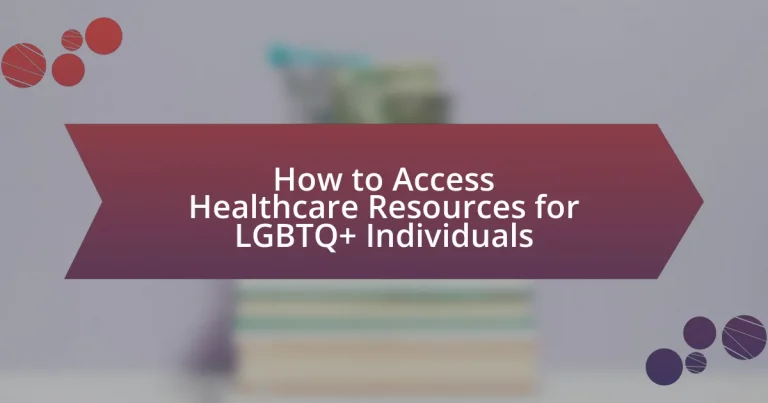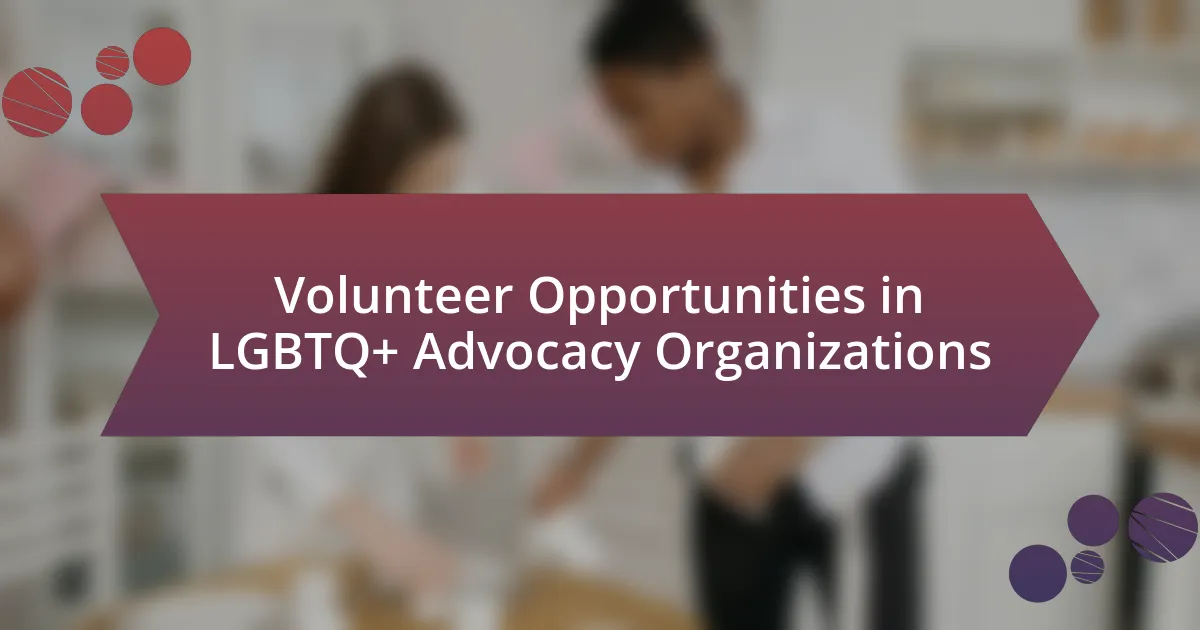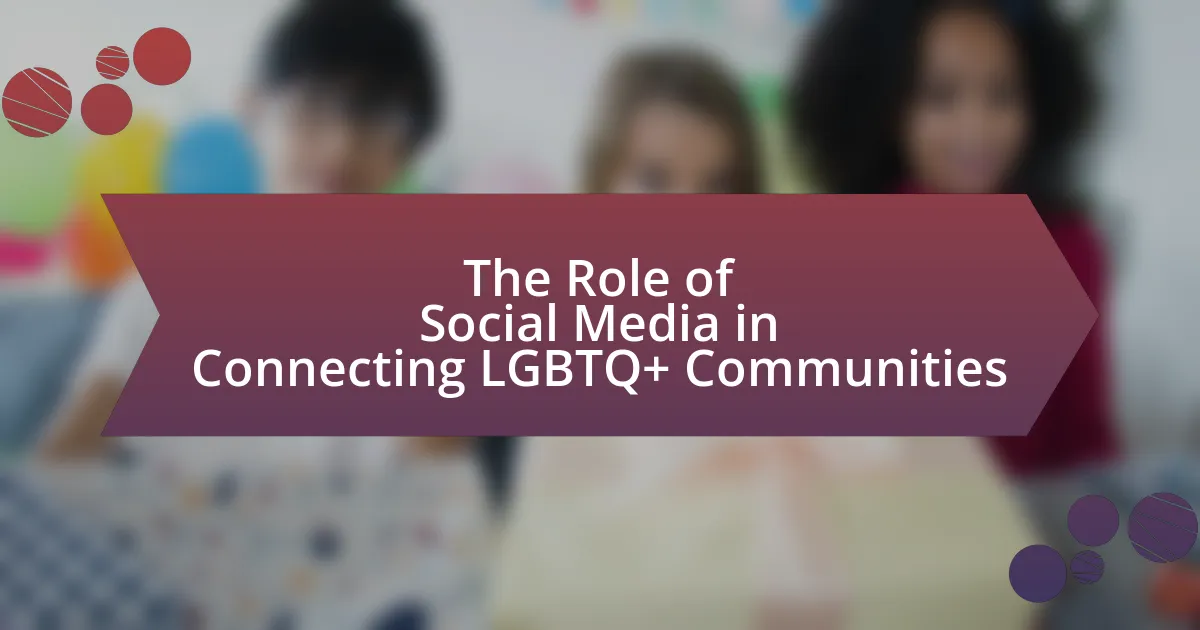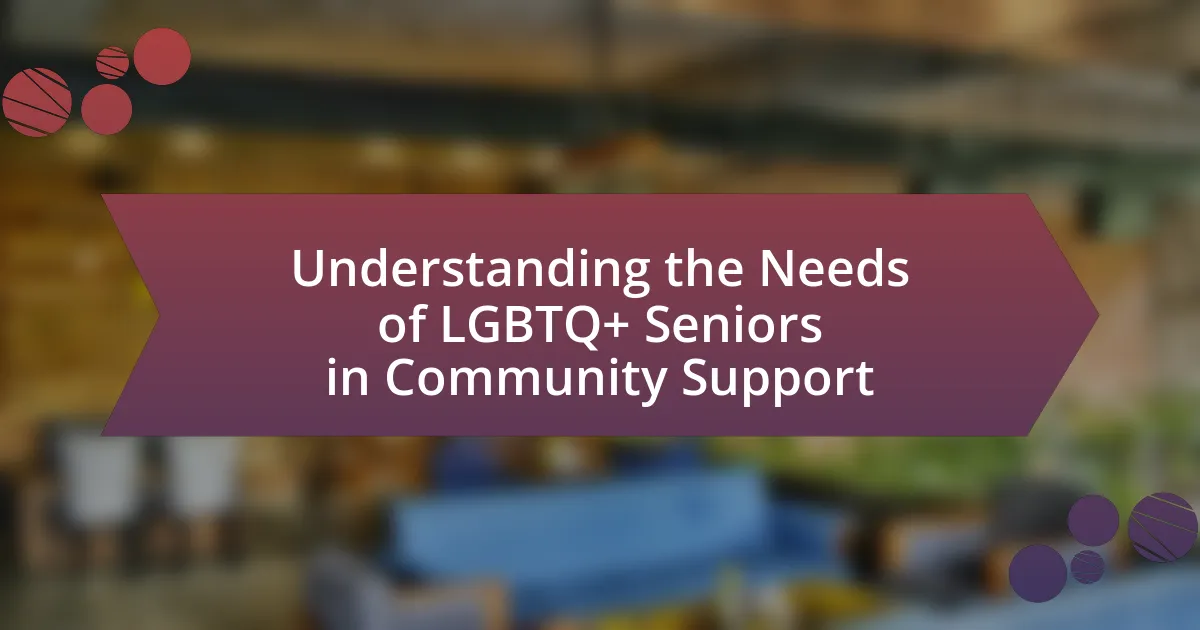Healthcare resources for LGBTQ+ individuals encompass specialized clinics, mental health services, and support organizations designed to meet the unique needs of this community. These resources address significant health disparities, including higher rates of mental health issues and barriers to care, by providing culturally competent services and inclusive policies. Access to tailored healthcare services, such as primary care, sexual health services, and gender-affirming treatments, is crucial for improving health outcomes and promoting well-being among LGBTQ+ populations. The article outlines the types of available services, the challenges faced in accessing care, and practical tips for finding supportive healthcare providers, emphasizing the importance of advocacy and legal protections in ensuring equitable healthcare access.

What are Healthcare Resources for LGBTQ+ Individuals?
Healthcare resources for LGBTQ+ individuals include specialized clinics, mental health services, and support organizations that cater to the unique needs of this community. For example, the Fenway Institute in Boston provides comprehensive healthcare services tailored for LGBTQ+ patients, including primary care, mental health support, and HIV prevention. Additionally, the Human Rights Campaign offers a directory of LGBTQ+-friendly healthcare providers, ensuring individuals can find inclusive care. Research indicates that LGBTQ+ individuals often face barriers to accessing healthcare, making these resources essential for promoting health equity and well-being within the community.
How do these resources cater specifically to LGBTQ+ needs?
Healthcare resources cater specifically to LGBTQ+ needs by providing tailored services that address unique health disparities and social determinants of health within this community. These resources often include specialized training for healthcare providers on LGBTQ+ cultural competency, ensuring that individuals receive respectful and informed care. For example, organizations like the Human Rights Campaign report that LGBTQ+ individuals face higher rates of mental health issues and substance abuse, prompting resources to offer targeted mental health services and substance use treatment programs. Additionally, many healthcare facilities now implement inclusive policies that recognize and support diverse gender identities, which is crucial for the well-being of transgender and non-binary individuals. This targeted approach is essential for reducing barriers to care and improving health outcomes for LGBTQ+ populations.
What types of healthcare services are available for LGBTQ+ individuals?
LGBTQ+ individuals have access to a variety of healthcare services tailored to their specific needs, including primary care, mental health services, sexual health services, hormone therapy, and gender-affirming surgeries. These services are designed to address the unique health concerns and disparities faced by the LGBTQ+ community. For instance, the National LGBTQ Task Force reports that LGBTQ+ individuals experience higher rates of mental health issues and substance abuse, highlighting the importance of accessible mental health services. Additionally, organizations like Planned Parenthood provide sexual health services that include STI testing and prevention, which are crucial for LGBTQ+ individuals.
How do these services differ from traditional healthcare offerings?
These services differ from traditional healthcare offerings by providing specialized, inclusive care tailored to the unique needs of LGBTQ+ individuals. Traditional healthcare often lacks cultural competency and may not address specific health concerns prevalent in the LGBTQ+ community, such as mental health issues related to discrimination or access to gender-affirming treatments. Research indicates that LGBTQ+ individuals face higher rates of certain health conditions and barriers to care, highlighting the necessity for services that are not only affirming but also knowledgeable about the specific health risks and social determinants affecting this population.
Why is access to healthcare resources important for LGBTQ+ individuals?
Access to healthcare resources is crucial for LGBTQ+ individuals because it directly impacts their physical and mental well-being. LGBTQ+ individuals often face unique health challenges, including higher rates of mental health issues, substance abuse, and sexually transmitted infections. According to the 2015 U.S. Transgender Survey, 40% of respondents reported having attempted suicide in their lifetime, highlighting the urgent need for accessible mental health services. Furthermore, discrimination in healthcare settings can lead to avoidance of necessary medical care, exacerbating health disparities. Ensuring access to inclusive and affirming healthcare resources is essential for improving health outcomes and fostering a supportive environment for LGBTQ+ individuals.
What health disparities do LGBTQ+ individuals face?
LGBTQ+ individuals face significant health disparities, including higher rates of mental health issues, substance abuse, and certain chronic conditions compared to their heterosexual counterparts. For instance, the 2021 National Health Interview Survey revealed that LGBTQ+ adults are more likely to experience anxiety and depression, with 39% reporting mental health struggles compared to 18% of non-LGBTQ+ adults. Additionally, LGBTQ+ individuals often encounter barriers to accessing healthcare, such as discrimination and lack of culturally competent providers, which exacerbate these disparities. The 2015 U.S. Transgender Survey found that 33% of respondents reported experiencing discrimination in healthcare settings, leading to avoidance of necessary medical care. These statistics underscore the urgent need for targeted interventions to address the unique health challenges faced by LGBTQ+ populations.
How can improved access to healthcare resources benefit the LGBTQ+ community?
Improved access to healthcare resources benefits the LGBTQ+ community by reducing health disparities and enhancing overall well-being. Access to culturally competent care allows LGBTQ+ individuals to receive appropriate preventive services, mental health support, and treatment for specific health issues, such as higher rates of mental health disorders and substance abuse. Research indicates that LGBTQ+ individuals face significant barriers to healthcare, including discrimination and lack of provider knowledge, which can lead to negative health outcomes. For instance, a study published in the American Journal of Public Health found that LGBTQ+ individuals are more likely to experience unmet healthcare needs compared to their heterosexual counterparts. By increasing access to inclusive healthcare resources, the LGBTQ+ community can achieve better health outcomes and improved quality of life.

How can LGBTQ+ individuals find healthcare resources?
LGBTQ+ individuals can find healthcare resources by utilizing specialized directories and organizations that focus on LGBTQ+ health. Resources such as the Human Rights Campaign’s Healthcare Equality Index and the National LGBTQ Task Force provide comprehensive lists of LGBTQ+-friendly healthcare providers. Additionally, local LGBTQ+ community centers often offer referrals and information about accessible healthcare services tailored to the needs of LGBTQ+ individuals. These resources are validated by ongoing efforts to improve healthcare access and quality for LGBTQ+ populations, as highlighted in studies by the Williams Institute, which emphasize the importance of inclusive healthcare practices.
What online platforms are available for locating LGBTQ+-friendly healthcare?
Online platforms available for locating LGBTQ+-friendly healthcare include QCard, Healthline’s LGBTQ+ Health Resource Center, and the Human Rights Campaign’s Healthcare Equality Index. QCard provides a directory of LGBTQ+-friendly healthcare providers, while Healthline offers articles and resources tailored to LGBTQ+ health needs. The Human Rights Campaign’s Healthcare Equality Index rates healthcare facilities on their LGBTQ+ inclusivity, helping individuals find supportive environments. These platforms are essential for ensuring access to appropriate and affirming healthcare for LGBTQ+ individuals.
How can social media be utilized to connect with healthcare providers?
Social media can be utilized to connect with healthcare providers by facilitating direct communication and engagement through platforms like Twitter, Facebook, and Instagram. These platforms allow individuals to follow healthcare providers, access health-related content, and participate in discussions, thereby fostering a sense of community and support. For instance, a study published in the Journal of Medical Internet Research found that 60% of healthcare providers use social media to engage with patients, which enhances accessibility and information sharing. Additionally, social media can serve as a tool for healthcare providers to promote LGBTQ+ inclusive services, share resources, and address specific health concerns relevant to the LGBTQ+ community, thereby improving overall healthcare access and awareness.
What role do LGBTQ+ organizations play in providing healthcare information?
LGBTQ+ organizations play a crucial role in providing healthcare information by offering tailored resources that address the specific health needs of LGBTQ+ individuals. These organizations often develop educational materials, conduct outreach programs, and provide training for healthcare providers to ensure culturally competent care. For instance, the Human Rights Campaign and the National LGBTQ Task Force provide comprehensive guides on accessing healthcare services, which include information on mental health, sexual health, and preventive care specifically designed for LGBTQ+ populations. Their efforts are supported by research indicating that LGBTQ+ individuals face unique health disparities, such as higher rates of mental health issues and barriers to accessing care, as highlighted in studies from the American Psychological Association.
What are the steps to ensure a positive healthcare experience?
To ensure a positive healthcare experience, individuals should prioritize clear communication, seek culturally competent providers, and advocate for their needs. Clear communication involves articulating symptoms and concerns effectively, which helps healthcare professionals provide accurate diagnoses and treatment plans. Seeking culturally competent providers ensures that healthcare professionals understand and respect LGBTQ+ identities, leading to more personalized care. Advocacy includes asking questions, requesting specific services, and voicing concerns about treatment, which empowers individuals to take an active role in their healthcare journey. These steps are supported by research indicating that effective communication and culturally sensitive care significantly enhance patient satisfaction and health outcomes.
How can LGBTQ+ individuals prepare for their healthcare visits?
LGBTQ+ individuals can prepare for their healthcare visits by researching and selecting healthcare providers who are knowledgeable and sensitive to LGBTQ+ health issues. This preparation includes checking if the provider has experience with LGBTQ+ specific health concerns, such as hormone therapy or mental health support. According to a study published in the Journal of Homosexuality, LGBTQ+ patients report better health outcomes when treated by providers who affirm their identities and understand their unique healthcare needs. Additionally, individuals should gather relevant medical history, including any previous treatments or medications, and consider writing down questions or concerns to discuss during the appointment. This proactive approach can enhance communication and ensure that healthcare needs are effectively addressed.
What questions should LGBTQ+ individuals ask their healthcare providers?
LGBTQ+ individuals should ask their healthcare providers about their experience and training in LGBTQ+ health issues. This includes inquiries such as, “What is your experience in treating LGBTQ+ patients?” and “How do you ensure a safe and inclusive environment for LGBTQ+ individuals?” Additionally, they should ask about specific health concerns relevant to their community, such as, “What preventive screenings do you recommend for LGBTQ+ individuals?” and “How do you address mental health issues that may disproportionately affect LGBTQ+ individuals?” These questions are crucial as studies indicate that LGBTQ+ individuals often face barriers to healthcare, including discrimination and lack of provider knowledge, which can impact their overall health outcomes.

What challenges do LGBTQ+ individuals face in accessing healthcare?
LGBTQ+ individuals face significant challenges in accessing healthcare, primarily due to discrimination, lack of provider knowledge, and financial barriers. Discrimination can manifest in both overt and subtle forms, leading to negative experiences that discourage individuals from seeking care. A study published in the American Journal of Public Health found that 29% of LGBTQ+ individuals reported experiencing discrimination in healthcare settings. Additionally, many healthcare providers lack adequate training on LGBTQ+ health issues, resulting in inadequate care and a reluctance among LGBTQ+ individuals to disclose their sexual orientation or gender identity. Financial barriers also play a crucial role, as LGBTQ+ individuals may face higher rates of unemployment and lack of insurance coverage, further complicating their access to necessary healthcare services.
How do stigma and discrimination impact healthcare access?
Stigma and discrimination significantly hinder healthcare access for LGBTQ+ individuals by creating barriers that discourage them from seeking necessary medical services. Research indicates that LGBTQ+ individuals often experience negative attitudes from healthcare providers, leading to avoidance of care, which is supported by a study published in the American Journal of Public Health that found 29% of LGBTQ+ individuals reported avoiding healthcare due to fear of discrimination. Additionally, stigma can result in mental health issues, further complicating access to care, as highlighted by the National Alliance on Mental Illness, which states that LGBTQ+ individuals face higher rates of anxiety and depression, impacting their willingness to engage with healthcare systems.
What are common barriers LGBTQ+ individuals encounter in healthcare settings?
LGBTQ+ individuals commonly encounter barriers in healthcare settings such as discrimination, lack of provider knowledge, and inadequate access to culturally competent care. Discrimination can manifest as negative attitudes or behaviors from healthcare providers, leading to reluctance in seeking care. A study published in the American Journal of Public Health found that 56% of LGBTQ+ individuals reported experiencing discrimination in healthcare settings. Additionally, many healthcare providers lack training on LGBTQ+ health issues, resulting in inadequate care and miscommunication. Furthermore, systemic barriers like insurance coverage limitations and geographic disparities can hinder access to necessary services, particularly for transgender individuals seeking hormone therapy or surgeries. These barriers collectively contribute to health disparities within the LGBTQ+ community.
How can these barriers be addressed by healthcare providers?
Healthcare providers can address barriers faced by LGBTQ+ individuals by implementing inclusive policies and training staff on cultural competency. Inclusive policies ensure that healthcare environments are welcoming and affirming, which can reduce discrimination and improve patient trust. Training staff on cultural competency equips them with the knowledge to understand and respect the unique needs of LGBTQ+ patients, leading to better communication and care. Research indicates that when healthcare providers receive training on LGBTQ+ issues, patient satisfaction increases and health outcomes improve, as evidenced by studies published in the Journal of Health and Social Behavior.
What resources are available for overcoming these challenges?
Resources available for overcoming challenges in accessing healthcare for LGBTQ+ individuals include specialized health clinics, support organizations, and online platforms. Specialized health clinics, such as those affiliated with the Gay and Lesbian Medical Association, provide tailored services that address the unique health needs of LGBTQ+ individuals. Support organizations like the Human Rights Campaign offer resources and advocacy for equitable healthcare access. Additionally, online platforms such as the LGBTQ+ Health Resource Center provide information on healthcare providers who are knowledgeable about LGBTQ+ issues. These resources collectively enhance access to appropriate healthcare services and support for LGBTQ+ individuals.
How can advocacy groups assist LGBTQ+ individuals in accessing healthcare?
Advocacy groups can assist LGBTQ+ individuals in accessing healthcare by providing resources, education, and support tailored to their specific needs. These organizations often offer information on LGBTQ+-friendly healthcare providers, ensuring that individuals can find inclusive and affirming medical services. For instance, the Human Rights Campaign’s Healthcare Equality Index evaluates and rates healthcare facilities on their policies and practices related to LGBTQ+ patients, helping individuals identify supportive environments. Additionally, advocacy groups may facilitate workshops and training sessions that educate healthcare professionals about LGBTQ+ health issues, thereby improving the quality of care received. Furthermore, they often engage in policy advocacy to promote equitable healthcare access and protections for LGBTQ+ individuals, which can lead to systemic changes that enhance overall healthcare accessibility.
What legal protections exist for LGBTQ+ individuals in healthcare?
LGBTQ+ individuals are protected in healthcare by various federal and state laws that prohibit discrimination based on sexual orientation and gender identity. The Affordable Care Act (ACA) includes provisions that prevent discrimination in healthcare settings, specifically under Section 1557, which prohibits discrimination on the basis of sex, including gender identity and sexual orientation. Additionally, the U.S. Supreme Court’s ruling in Bostock v. Clayton County (2020) affirmed that Title VII of the Civil Rights Act of 1964 protects employees from discrimination based on sexual orientation and gender identity, which extends to healthcare providers as employers. Furthermore, many states have enacted their own laws that provide additional protections for LGBTQ+ individuals in healthcare, ensuring equitable access to medical services.
What practical tips can help LGBTQ+ individuals access healthcare resources effectively?
LGBTQ+ individuals can access healthcare resources effectively by seeking providers who are knowledgeable and affirming of their identities. Research indicates that LGBTQ+ individuals often face discrimination in healthcare settings, which can deter them from seeking necessary care. Therefore, finding LGBTQ+-friendly clinics or healthcare professionals, often listed on resources like the Human Rights Campaign’s Healthcare Equality Index, can significantly improve their healthcare experience. Additionally, utilizing online platforms that specialize in LGBTQ+ health resources, such as the National LGBTQ Task Force, can provide valuable information on available services and support networks. Engaging in community support groups can also help individuals share experiences and recommendations for healthcare providers, fostering a more informed approach to accessing care.





